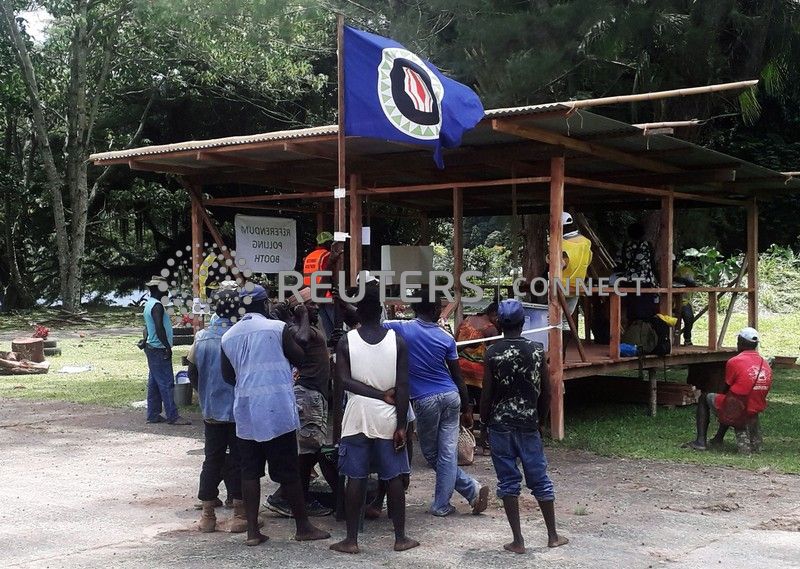BUKA, 16 DECEMBER 2019 (SBS) – Papua New Guinea’s prime minister James Marape joined thousands of jubilant Bougainville residents as they celebrated Friday, days after they voted to secede from his country, but cautioned that “hard work” lay ahead if the region is to secure its independence.
Referendum results delivered this week saw 98 percent of Bougainvilleans reject greater autonomy inside Papua New Guinea in favour of a split from their neighbours across the Solomon Sea.
The landmark vote was the cornerstone of a 2001 peace agreement that followed a brutal decade-long civil war between Bougainville rebels, Papua New Guinea security forces and foreign mercenaries that left up to 20,000 people dead.
Thousands gathered Friday in the region’s old capital, Arawa, to rejoice at an official post-vote ceremony, where groups in traditional dress danced amid a sea of Bougainville flags, while others drummed bamboo pipes.
But recently appointed prime minister Marape cautioned the crowd that the “hard work” now lay ahead for both Bougainville and the rest of PNG.
The post-conflict region needed to move on from the past and take stock of its own resources, he said, if it is to achieve full independence.
“Instead of holding guns, hold shovels,” he told a cheering crowd. “Hold these and start to work. Go back home and work.”
A long political process lies ahead and leaders face formidable financial and administrative challenges to turn a cluster of poor Pacific islands into a fully-fledged nation.
The 10-year war that ended in 1998 was rooted in a struggle over revenues from the now-shuttered Panguna copper mine, which at one point accounted for more than 40 percent of Papua New Guinea’s exports.
Marape pledged to symbolically deliver the referendum results to Papua New Guinea’s parliament, which must still ratify the outcome amid fears Bougainville’s departure might spark a rush of regions calling for greater autonomy.
“I must honour both flags, both people,” Marape later posted on Facebook.
“We must continue to show the world that Melanesian consensus can have good outcomes that is a win-win for all people in our country.
The landslide vote for independence had sent “shockwaves” through Papua New Guinea’s government, according to referendum chair Bertie Ahern, who said PNG officials expected a larger number of voters would back greater autonomy.
Ahern cautioned that Bougainvilleans would need to “be united to see this through”.
“While that past has been a difficult one, the result was an expression of hope for the future, and an honouring of those who you lost in the conflict,” he said in a statement.
Wednesday’s referendum results are expected to prompt a dash for influence among regional powers China, the United States and Australia.
Attuned to regional rivalries, senior figures in Bougainville’s independence movement have already tried to start a bidding war — warning the nascent nation would turn to Beijing if Western countries do not play their cards right and offer financial support.




